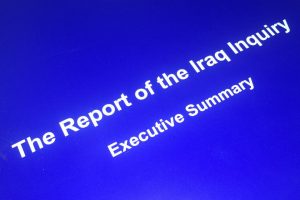
Sir John Chilcot’s Iraq Inquiry Report, published on 6 July, is a major milestone in British public life. It’s extremely wide-ranging in its 2.6 million words, spread over its executive summary and 12 main volumes. And it needed to be, not least to address the concerns of Service families still living with the consequences of the conflict. Much of the report makes for sober reading.
Chilcot offers a deeply forensic account of the way in which civilian, military and intelligence services worked together, and with the political leaders of the day, to deliver a major overseas intervention. It identifies patterns of behaviour and culture that are hard to spot day-to-day, but which become apparent when seen over the extended period (2001 to 2009) covered by the report.
 Despite the EU Referendum result and its political aftershocks, the report’s publication attracted much media attention, three days of Parliamentary debate and a House of Commons Defence Committee hearing. But what happens now?
Despite the EU Referendum result and its political aftershocks, the report’s publication attracted much media attention, three days of Parliamentary debate and a House of Commons Defence Committee hearing. But what happens now?
The report doesn’t just look at the department I lead, the Ministry of Defence (MOD). It covers the activity of all the government departments involved in the Iraq intervention. Indeed, many of its observations will be relevant for all departments, whether represented on the National Security Council or not.
And that’s why we are now working closely together across government to assess which issues identified by the report might still need fixing. There’s been a great deal of change in the UK’s national security apparatus in recent years, not least the establishment of the National Security Council and its supporting bodies. It feels to me, as someone involved in national security on a daily basis but new to it, that we do things in a pretty coherent, collaborative way.
In the MOD specifically, we’ve changed much of the way the department works – including by learning lessons from all the operations we’ve undertaken over recent years.
But there’s absolutely no room for complacency. As Sir John Chilcot said in his 6 July statement, “the UK military role in Iraq ended a very long way from success”; and, “the Government failed to achieve its stated objectives”. When you read the report, you can feel the machinery of government grinding, lurching, not operating smoothly.
However much we have learned and changed, I and other colleagues have a clear sense that there is more to do across government, including in Defence. It is because our business is so important – and so difficult – that we must make sure we do everything we can to ensure that all of the key lessons are learned, implemented and endure.
That means looking closely not only at the way our business is organised – the structures and processes – but also at how we do business – the cultures and behaviours. In pressurised, volatile situations we all know that organisations tend to default to comfortable ways of working, and Chilcot amply demonstrated the dangers of that.
For example, do we query our analysis of the world in which we operate strongly enough? Do we enable our people to challenge received wisdom? Are we good enough at thinking ourselves into the future? Do we check and double-check our strategies rigorously enough? Are we sufficiently diverse to embrace a range of perspectives in our decision-making? How adaptable are the various cultures within government?
The answer to these questions, and to many others, is often “not really” or “not always”. As soon as “The Report of the Iraq Inquiry” was published, I set up a team, led by a senior civil servant and working with military colleagues, to do a diagnostic of how we currently do business, and to see how it shapes up against what Chilcot tells us. Where we fall short, we’ll be taking action to make sure we do better in future.
We’ll be transparent about what we’re doing. Of course, there’s a certain amount in the national security sphere that has to be done in confidence. But there’s also a lot that doesn’t need to be, and we want to encourage a really open dialogue about what needs to change. This blog is part of that.
The country is engaged overseas in a number of theatres and there will be overseas interventions in future. We cannot know when, and we cannot know where, but the world remains as uncertain and dangerous as ever. When we make those interventions, our commitment is to ensure that we do so on the basis of the best possible understanding of the situation, a robust decision-making process, and with the very best tools needed to do the job and a culture that does not stifle debate and challenge. Chilcot, with its sweep and its insight, will help all of us across the Civil Service to do that.

4 comments
Comment by Rob B posted on
Hello Mr Lovegrove,
First let my say that I have only browsed Sir Chilcot’s report. But on first reading, I agree, it does appear to be rather sobering.
But, for me, the main criticism is that the government of the day made decision to act unilaterally.
Now suppose this criticism is unassailable. Then is any subsequent criticism of the Civil Service reasonable? My understanding is that it only acts in accordance with government dictates. So, for me, the Civil Service is in the clear and (if I may) my own sobriety is unaffected.
The only criticism I might allow is that the Civil Service doesn’t seem to have advised government loudly, clearly and accurately enough.
Your blog, if I can summarise, seems to challenge “cultural torpor” and call for empowerment in “challenging received wisdom”. But challenge at what level? It seems futile when impartiality even within the Civil Service ultimately allows for no criticism whatsoever - be it up, down, left or right.
Now, take the ever-changing heads of government out of the picture. Then you - as a permanent head within the Civil Service - have responsibly to the “arms and legs” and all other far-serving members of the “body politic”. Especially, then, I guess the best you can do is to ensure that the ground troops are properly equipped.
And look again at that core Civil Service value of impartiality. At its best, fine, it seems to advocate neutrality, lack of prejudice, open-mindedness etc. – even freedom! But over-indulged can it lead to disinterest and the very “complacency” you guard against? So to what extent does impartiality agree with robust decision making?
Maybe I can bring in Tennyson here:
Is there confusion in the little isle?
…
Let us swear an oath, and keep it with an equal mind,
In the hollow Lotos-land to live and lie reclined
On the hills like Gods together, careless of mankind.
…
Surely, surely, slumber is more sweet than toil, the shore
Than labor in the deep mid-ocean, wind and wave and oar;
O, rest ye, brother mariners, we will not wander more.
[Alfred, Lord Tennyson; The Lotos-Eaters]
No, maybe not. For me, I am a bit more partial to Kipling:
I shan’t forgit the night
When I dropped be’ind the fight
With a bullet where my belt-plate should ’a’ been.
[Rudyard Kipling; Gunga Din]
And cheers! Maybe I’ll just drop in to The Northumberland Hussar on my way home!
Link to Tennyson, The Lotos-Eaters:
https://www.poetryfoundation.org/poems-and-poets/poems/detail/45364
Link to Kipling, Gunga Din:
https://www.poetryfoundation.org/poems-and-poets/poems/detail/46783
Comment by Chris Lamb posted on
'For example, do we query our analysis of the world in which we operate strongly enough? Do we enable our people to challenge received wisdom?'
There are many 'lessons' to be learnt from the Chilcot Report but one of the key questions is how the Foreign and Commonwealth Office Legal Advisors' advice, which was spot on with regards to the necessity for a second UN resolution over Iraq, was so easily over-ruled. The FCO Legal Advisors were- and are- the most senior civil servants with experience and expertise in international law and are usually deferred to for that reason. On this occasion, although their advice challenged the 'received wisdom', it was treated with less than respect and, in an unwarranted way, excluded from the government's final decision making stages.
Comment by Charlotte Smith posted on
I thought the civil service was supposed to be free of political bias in any shape or form, so i was surprised and had both my eyebrows raised when the subject of the Chilcot Report was used in this blog entry. Whilst i appreciate the Permanent Secretary of the MOD was outlining the need for reform, using the Chilcot Report was probably not the best example to use. It is wrapped in political dogma and it is so controversial, not least in the fact that it has taken years to produce it and one has to question why it took the author of the report so long to write it.
Perhaps a better commitment to reform and to illustrate that there is a renewal to the commitment to reform in MOD, is repledging the Covenant between those who serve in the Armed Forces and the Government department (MOD). Update it to the requirements of the 21st century by promising that each soldier, sailor, spy and whoever serves on the battlefield or in the shadows in defence of the Realm, are given the right tools and equiptment to do the job and protect themselves. And also make a promise on being demobbed to civvy street that everyone is is given priority access to housing, welfare, job opportunities ahead of everyone else. It is the least that can be done for those who put their lives at risk in defence of our country.
Comment by Stephen Lovegrove posted on
Thank you very much for your comment. The Chilcot Report is very critical of the way in which government operated during the period 2001-09, and it’s very important that we learn from that. We don’t regard it as political to recognise that government departments need to be as efficient and effective as possible.
The MOD remains committed to the Armed Forces Covenant, which is a pledge to provide a wide range of support to service personnel and their families during and after service. It is about ensuring fairness for the Armed Forces Community so that they get the same outcomes in terms of community services as the civilian population and additional measures are provided for those who have given the most, such as the injured and the bereaved.